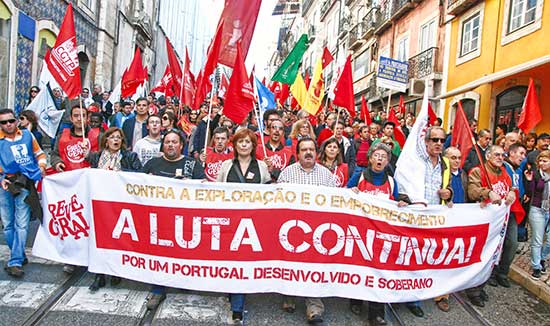General strike in Portugal
European workers resist bankers’ takeover
By
John Catalinotto
Published Dec 1, 2011 8:52 PM
|
Photo: Jorge Cabral, Avante
|
More than 3 million workers in Portugal walked off the job on Nov. 24 to protest austerity measures and the takeover of their country’s economy by the “Troika” — the European Union, the European Central Bank and the International Monetary Fund. This has been done with the collusion of the big Portuguese capitalists and their political parties.
The general strike stopped public transport — as well as 600 airplane flights — and shut factories all over the country. Tens of thousands of people marched in Lisbon and other cities as part of the worker action. Spokespeople for the CGTP-IN, the main union confederation behind the strike, called it the largest general strike ever in this country of 11 million people. The CGTP-IN said that workers’ actions will continue in the weeks ahead. (cgtp.pt)
A center-right, Peoples Party/Social Democratic Party bloc recently took over the government from the misnamed Socialist Party — which had also been carrying out austerity measures. All the above parties supported the deal with the Troika that is supposed to bring a $100 billion bailout of Portugal’s debt. In return, the government is imposing an extremely anti-worker austerity program, which includes job cuts and tax increases.
The Portuguese Communist Party and the Left Bloc opposed the deal.
The new government cut the current end-of-year bonuses in half for all workers and completely cancelled holiday and year-end bonuses for civil servants in 2012. Health services, too, are being cut. It has extended the working day by half an hour.
As a result of the ongoing capitalist crisis that began in 2008 and the cuts already made in government and social programs, the country is in its biggest recession in more than three decades. Unemployment plus underemployment now reaches 18.2 percent of the work force. Despite the deal, Fitch Ratings, the smallest of the “big three” credit rating firms, cut its rating of Portuguese bonds to the level of junk bonds on Nov. 24.
One banner in Lisbon read: “Only the struggle can give us what they’re about to take away.” Many read, “Oppose exploitation and impoverishment” and “The struggle continues.” (PCP photos) Reuters reported that one favorite chant was, “Spain, Greece, Ireland, Portugal, our struggle is international!”
Bankers’ regimes in Europe
The virtual bank takeover of many European governments indicates the importance of that last chant. In November, handpicked bank “technocrats,” relatively unknown as politicians, replaced the flamboyant right-wing billionaire prime minister, Silvio Berlusconi, in Italy and the third-generation premier, George Papandreou, in Greece. In Portugal and more recently in Spain, center-right governments even more tightly linked to the banks replaced nominally center-left premiers — who had also carried out austerity, but at a slower pace.
In Greece, the workers of Hellenic Steel Co. in Aspropyrgos, a suburb of Athens, have been on strike since Nov. 1. They are demanding the immediate rehiring of 34 of their co-workers who had been dismissed. In a resolution, they called on the working class and all poor people to support them with whatever available form of solidarity. (inter.kke.gr) The major Greek union confederation, PAME, close to the Communist Party of Greece (KKE), has held regular general strikes.
In Spain, six columns of marchers representing the “indignant ones,” whose movement began last May, began marching downtown from different neighborhoods in Madrid on Nov. 28, weaving their way to Neptune Plaza in front of the Congress of Deputies. There, 2,000 people called for an end to layoffs, job insecurity, cutbacks and the privatization of public services. They agitated for the holding of a general strike.
The inability of capitalism to recover from this systemwide crisis that exploded in 2008 and is now erupting for a second time in Europe has threatened the living conditions of the European working class, striking first those countries with weaker economies. This renews the need for the internationalist sentiment contained in the banner the KKE hung from the Acropolis in Athens a year ago: “Peoples of Europe, rise up!”
Articles copyright 1995-2012 Workers World.
Verbatim copying and distribution of this entire article is permitted in any medium without royalty provided this notice is preserved.
Workers World, 55 W. 17 St., NY, NY 10011
Email:
[email protected]
Subscribe
[email protected]
Support independent news
DONATE


